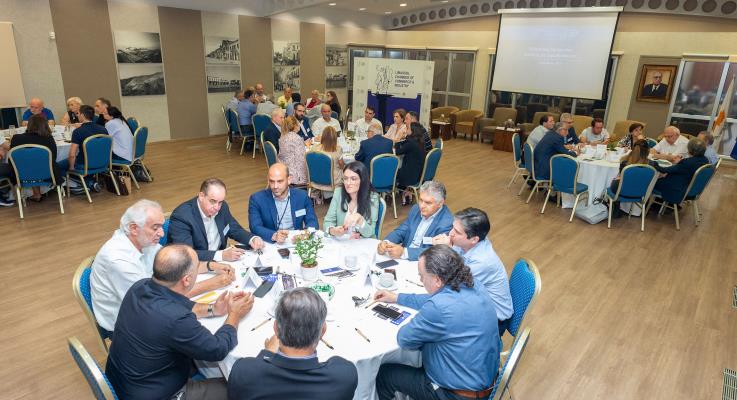The Limassol Chamber of Commerce and Industry (Evel), in partnership with the European Parliament, held its second annual round table discussion on Thursday evening, with discussions revolving around a number of crucial subjects.
These included the remote working bill, the Green Line regulation, the financial sector, the geopolitical landscape in the Mediterranean, and challenges within the labour market.
A number of prominent politicians were present at the event, including Loucas Fourlas, Eleni Stavrou, Georgios Georgiou, Niyazi Kızılyürek, and Costas Mavrides.
In terms of the discussions concerning the regulation of remote working, Georgios Georgiou mentioned the ongoing fluidity in the debates.
“We have concluded that things are fluid, they are currently taking shape, final decisions may not be made, and there may be objections from the business world as well as from the trade unions,” he said.
In addition, he expressed hope for a balanced solution between the business community and trade unions to facilitate innovative forms of telecommuting that do not compromise the rights of workers.
MEP Niyazi Kızılyürek stressed the need for enhanced understanding and contact among stakeholders, but especially in the context of bi-communal ties.
“There is a lack of proper information on this matter, and many people do not fully understand how it can work,” he said.
Moreover, he proposed organising a meeting in Limassol to foster collaboration between Turkish Cypriot and Greek Cypriot entrepreneurs, especially concerning trade relations and the Green Line regulation.
MEP Costas Mavrides, the Chair of the Political Committee for the Mediterranean at the European Parliament, underscored the urgency of creating a Common Defence and Security Mechanism within the EU.
He emphasised that “without this mechanism, the goals for the environment, society, and the economy cannot be achieved”.
MEP Eleni Stavrou acknowledged the complexities, and said that “we reached a consensus that a new Middle East is forming, in which Cyprus will have a role to play”.
Despite the challenges in reaching definitive conclusions due to the current fluidity, she highlighted Cyprus’ emerging role in this evolving scenario.
Shifting to the labour market, MEP Loucas Fourlas highlighted significant changes, stating that “it is changing significantly, and it appears that we are not ready to address it”.
Furthermore, he stressed the urgent need for reforms, particularly in specialised personnel and workforce development trainers.
Fourlas emphasised the necessity for comprehensive educational reforms, starting from the early school years, underlining the importance of teaching essential ‘soft skills’ to children.
These discussions shed light on the complexities and ongoing developments in crucial areas, stressing the critical need for collaboration, innovative solutions, and a comprehensive understanding to effectively navigate the complicated challenges anticipated in the future.






Click here to change your cookie preferences